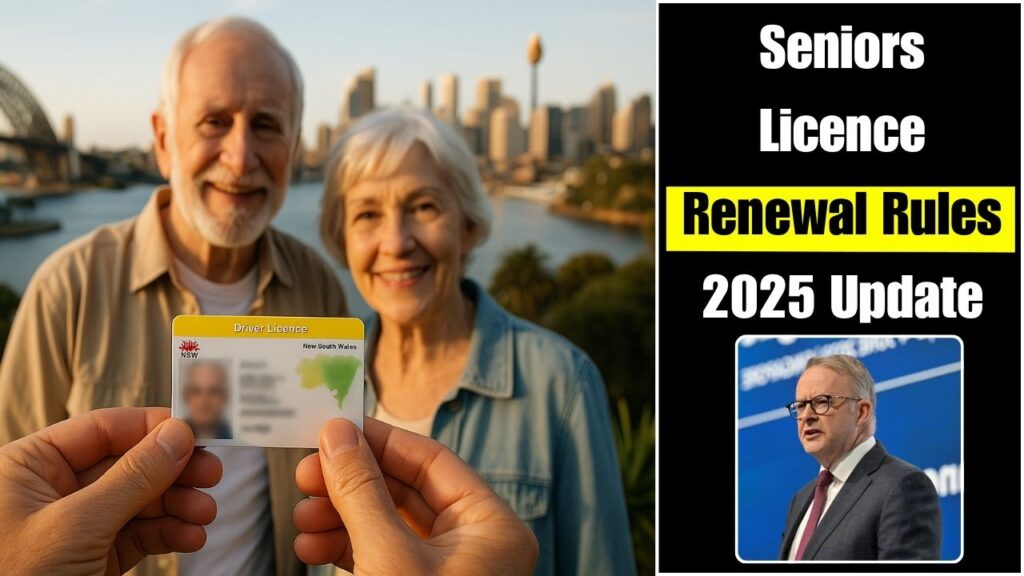In Australia, driving remains a symbol of independence, especially for older citizens who rely on their cars for everyday needs. As 2025 approaches, new Seniors Licence Renewal Regulations will come into effect, requiring drivers aged 70 and above to undergo regular medical assessments and vision checks. These updates are part of Australia’s broader effort to enhance road safety standards and protect senior motorists. Understanding the new requirements and how to book your appointments early will help seniors continue driving confidently and legally under the 2025 renewal framework.

Understanding the 2025 Seniors Licence Renewal Rules
The updated licence renewal policy for senior drivers introduces stricter medical and eyesight evaluations from 2025. Drivers aged 70 and older must submit a medical fitness certificate from their doctor and pass an approved vision screening test. These steps ensure that ageing motorists maintain safe driving abilities. The Australian government aims to balance safety with independence through transparent renewal guidelines and regular check-ups. By following these requirements, senior citizens can avoid licence suspension and enjoy continued mobility while ensuring their well-being on Australian roads.
 Age based licence tests expand in 2025 what over 65 Australian drivers must know to stay compliant
Age based licence tests expand in 2025 what over 65 Australian drivers must know to stay compliant
How to Book Medical and Vision Appointments Easily
Booking the mandatory medical and vision appointments for licence renewal has become simpler with digital and in-person options. Seniors can use Service NSW or myGov portals to schedule medical checks online or visit their local GP for an official report. For the eyesight test, optometrists across Australia now offer fast-track appointments linked directly to driver licensing authorities. Seniors are advised to complete these assessments well before the renewal date to avoid delays. Early booking ensures smooth licence processing and uninterrupted driving privileges.
Importance of Health and Safety in Senior Driving
Regular health reviews help identify issues affecting reaction time, vision clarity, and motor coordination. These assessments don’t just meet government requirements—they ensure older Australians remain safe behind the wheel. The new senior driver regulation encourages proactive care, where doctors can recommend adaptive measures like daylight-only driving if needed. By emphasizing health, Australia strengthens road safety awareness among elderly drivers while preserving their independence. This initiative ensures that senior drivers stay both responsible and confident on the road.
Summary and Analysis
The 2025 Senior Licence Renewal Regulations highlight the growing importance of balancing safety and autonomy for ageing Australians. Mandatory health evaluations and vision screenings are designed to protect both drivers and other road users. By adapting to these new standards, senior citizens can maintain freedom of movement without compromising on safety. Early preparation, regular doctor visits, and timely booking will be the key to hassle-free licence renewals for Australians aged 70 and above in 2025 and beyond.
| Requirement | Details for 2025 |
|---|---|
| Age Group | 70 years and above |
| Medical Certificate | Mandatory doctor assessment |
| Vision Test | Optometrist evaluation required |
| Renewal Interval | Every 1–3 years (state-based) |
| Booking Platform | Service NSW / myGov |
Frequently Asked Questions (FAQs)
1. At what age do seniors need to renew their licence?
From 2025, drivers aged 70 and above must renew with medical and vision checks.
2. Where can seniors book their medical checks?
Seniors can book through their GP or via online portals like Service NSW or myGov.
3. How often must vision tests be done?
Vision tests are typically required every one to three years depending on age and health.
4. What happens if a senior fails the medical test?
If a driver fails, the licence may be restricted, suspended, or require further assessment.





